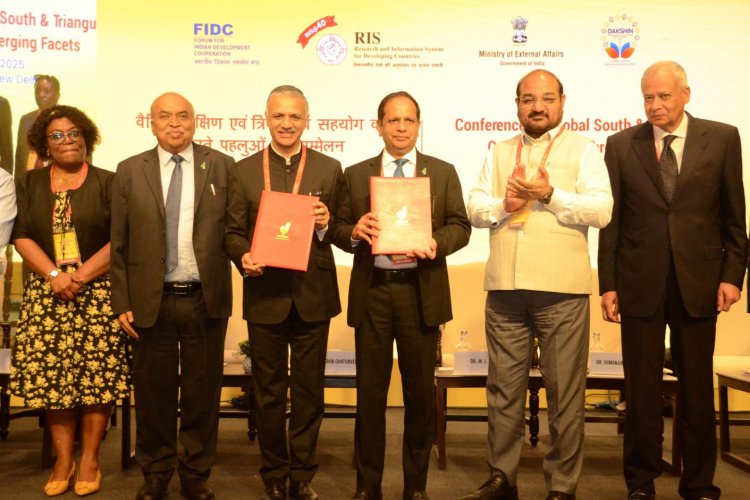



ICRISAT and RIS launched the Centre of Excellence for South-South Cooperation in Agriculture (ISSCA) to transform agriculture in developing countries. Established in 1972, ICRISAT, a non-profit, researches drought-tolerant crops to combat poverty and climate change in Asia and sub-Saharan Africa, headquartered in Hyderabad with hubs in Kenya and Mali.

Copyright infringement not intended
Picture Courtesy: RURAL VOICE
The International Crops Research Institute for the Semi-Arid Tropics (ICRISAT) has partnered with the Research and Information System for Developing Countries (RIS) to launch a new Centre of Excellence.
The International Crops Research Institute for the Semi-Arid Tropics (ICRISAT) is an international organization dedicated to improving agriculture in the world's harshest farming environments.
The Government of India and the CGIAR (Consultative Group on International Agricultural Research), a global partnership for agricultural research, established ICRISAT through a Memorandum of Agreement in 1972. It operates as a non-profit, non-political public international research organization.
ICRISAT's work targets the semi-arid tropics of Asia and sub-Saharan Africa, regions characterized by low rainfall, poor soils, and high levels of poverty.
It is headquartered in Hyderabad, Telangana. It maintains a strong global presence with two major regional hubs in Nairobi, Kenya (for Eastern and Southern Africa) and Bamako, Mali (for Western and Central Africa).
ICRISAT's research is focused on crops that are vital for the food and nutritional security of millions living in the drylands.
The institute conducts advanced research on five highly nutritious and drought-tolerant crops:
A core part of its mission is to help smallholder farmers adapt to and mitigate the effects of climate change. It achieves this by developing and sharing improved, climate-resilient crop varieties and hybrids, along with sustainable farming practices.
It was awarded the prestigious 2021 Africa Food Prize for its Tropical Legumes Project, which successfully improved food security across 13 countries in sub-Saharan Africa.
The collaboration is with the Research and Information System for Developing Countries (RIS), a New Delhi-based autonomous policy research institute that specializes in issues related to international economic development, trade, and South-South cooperation.
It aims to serve as a hub for sharing knowledge, technology, and successful agricultural models among developing countries of the Global South.
It aims to utilize India's vast experience and ICRISAT's scientific expertise to benefit other nations facing similar agro-climatic challenges.
It empowers developing countries to become partners in finding solutions for their own challenges, promoting self-reliance and collective growth.
It will facilitate the transfer of climate-smart agricultural technologies and policies that have proven successful in India and other regions to new geographies.
Must Read Articles:
One CGIAR-integrated partnership
Govt. allows ICRISAT to use drones for agricultural research
Source:
|
PRACTICE QUESTION Q. Critically analyze the role of sustainable agriculture in addressing food security challenges in the context of climate change. 150 words |






© 2026 iasgyan. All right reserved